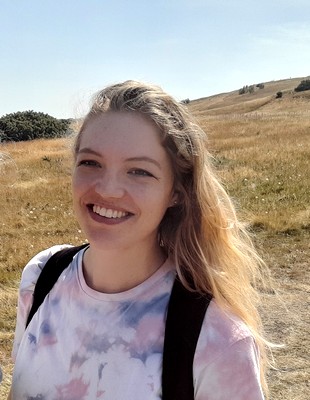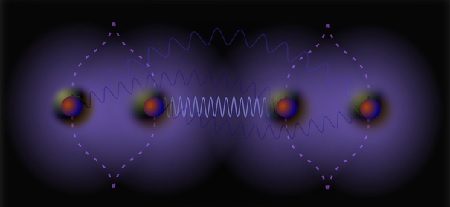Prijs voor uitleg van complex kwantumfenomeen
RUG-promovenda Martine Schut vertelt graag over haar werk op het snijvlak van wiskunde en natuurkunde. Ze houdt lezingen over de relativiteitstheorie van Albert Einstein voor scholieren en krijgt vrijdag 26 mei een prijs voor haar artikel over een experiment dat kan aantonen of zwaartekracht een kwantumfenomeen is.
‘Ik ben al mijn hele studie bezig geweest met outreach’, vertelt Martine Schut. ‘Ik wil de wetenschap toegankelijk maken.’ In haar geval gaat het vooral om wiskunde en natuurkunde, al heeft ze in 2014 ook meegewerkt aan het oprichten van een Groningse afdeling van de JWG, de landelijke vereniging voor kinderen en jongeren van 8 tot 21 jaar die geïnteresseerd zijn in sterrenkunde. ‘Voor corona hadden we zo’n vijftig bezoekers op onze bijeenkomsten.’

Pluto
Sinds 2020 werkt ze aan een promotie op het snijvlak van wiskunde en natuurkunde. Ze houdt zich bezig met een experiment dat moet aantonen of de zwaartekracht de regels van de kwantummechanica volgt. ‘Er zijn vier fundamentele krachten in de natuurkunde, waarvan er drie al goed zijn beschreven via de kwantummechanica. Voor de zwaartekracht is dat is dat theoretisch wel gedaan, maar er is nog geen experimenteel bewijs.’
Als zwaartekracht een kwantumfenomeen is, dan verwachten natuurkundigen dat bij deze kracht een deeltje hoort, dat alvast het ‘graviton’ is gedoopt. Schut: ‘Alleen is het een heel zwakke kracht, waardoor dat deeltje moeilijk is aan te tonen.’ Een standaardtechniek in de natuurkunde om zulke deeltjes aan te tonen is het gebruik van een deeltjesversneller. Zo is bijvoorbeeld het Higgs-deeltje uiteindelijk ontdekt. ‘Alleen zou er voor het graviton een versneller nodig zijn met een doorsnede die gelijk is aan de baan van Pluto om de zon. Dus dat kan niet’, vertelt Schut.
Prijs
Zij werkt aan een project om het graviton via een andere weg zichtbaar te maken, in een experiment dat niet de brute kracht van een deeltjesversneller inzet, maar op een heel subtiele manier werkt, gebruikmakend van een aantal merkwaardige kwantumfenomenen. Over dat experiment schreef Schut een artikel voor het Nederlands tijdschrift voor Natuurkunde (NtvN), dat jaarlijks een wedstrijd organiseert voor promovendi die hun onderzoek voor een breder publiek willen uitleggen. Met haar beschrijving van het experiment dat het bestaan van het graviton kan aantonen won Schut de tweede prijs.

Verstrengeling
Het experiment maakt gebruik van twee fenomenen uit de kwantummechanica: superpositie en verstrengeling. Superpositie betekent dat een deeltje tegelijkertijd op twee verschillende posities aanwezig is. Verstrengeling betekent dat twee deeltjes een tegenovergestelde waarde hebben, maar dat niet vast staat welke deeltje welke waarde heeft totdat er één gemeten is. ‘Als je een blauwe en een rode knikker hebt, is er één blauw en één rood. Maar bij kwantumdeeltjes hebben de knikkers geen kleur totdat je er eentje bekijkt. Als dat deeltje rood is, zal het andere blauw zijn.’ Het bijzondere van dit fenomeen is dat het zelfs opgaat wanneer beide deeltjes zich ver uit elkaar bevinden, en zonder dat er communicatie is.
Beide fenomenen zijn belangrijk voor bijvoorbeeld het werken van een kwantumcomputer. Maar in haar artikel voor het NtvN beschrijft Schut hoe ze te gebruiken zijn om de uitwisseling van een graviton tussen twee kwantumdeeltje te kunnen zien. Het gaat om zeer subtiele fenomenen, juist omdat zwaartekracht zo zwak is. Schut legt uit hoe zwak dat is: 'Wanneer je de elektromagnetische kracht tussen een electron en een waterstofkern net zo zwak wil maken als de zwaartekracht die ze ondervinden in een waterstofatoom, dan moeten ze net zover van elkaar vandaan staan als de grootte van het observeerbare universum'.
Wetenschapsdate
Het artikel beschrijft de natuurkundige kant van het experiment, maar Schut is ook betrokken bij de wiskundige beschrijving ervan. Zij maakt deel uit van een groepje promovendi die zowel vanuit de wiskunde als natuurkunde werken, en aangesteld zijn bij het Van Swinderen Instituut voor Deeltjesfysica en Zwaartekracht, en bij het Bernoulli Instituut voor Wiskunde, Computerwetenschap en Kunstmatige Intelligentie. ‘Een kwantumfenomeen als verstrengeling kun je wiskundig zien als een knoop. Op die manier probeer ik kwantumverstrengeling wiskundig te beschrijven.’ Ze hoopt volgend jaar te promoveren, om daarna verder te gaan als postdoc onderzoeker. ‘Ik ben al aan het solliciteren.’ Maar ze blijft haar werk ook uitleggen. ‘Binnenkort doe ik mee aan het RUG-programma Wetenschapsdate, waarmee scholen een gastles van een wetenschapper kunnen boeken.’
Meer nieuws
-
29 januari 2026
Microplasticonderzoek - opgeblazen nieuws of een echt gevaar?
-
27 januari 2026
ERC Proof of Concept grant voor Maria Loi

